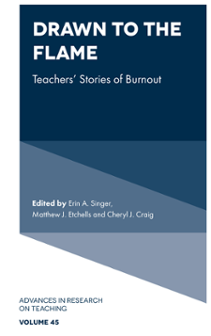
Index
ISBN: 978-1-80382-416-1, eISBN: 978-1-80382-415-4
ISSN: 1479-3687
Publication date: 24 October 2023
Citation
(2023), "Index", Singer, E.A., Etchells, M.J. and Craig, C.J. (Ed.) Drawn to the Flame (Advances in Research on Teaching, Vol. 45), Emerald Publishing Limited, Leeds, pp. 229-235. https://doi.org/10.1108/S1479-368720230000045017
Publisher
:Emerald Publishing Limited
Copyright © 2023 Erin A. Singer, Matthew J. Etchells and Cheryl J. Craig. Published under exclusive licence by Emerald Publishing Limited
INDEX
- Prelims
- Introduction: The Burning Out of Teachers and Administrators in Public Education
- Radically Healing or Burned Out: Experiences Among Black Teachers
- A Narrative Inquiry Investigating Teacher Burnout at a Bronx New York Middle School in 2020
- Leaving so Soon? Reality Shock Among Novice Teachers
- Not Picture Perfect: The Storied Lives of Art Teachers in Urban America
- Resilience and Persistence in the Face of Burnout
- “Who Wants to Be a Teacher in the Face of These Anti-queer Laws?” Burnout Perspective From a Gay Educator
- Parallel Stories of Publicly Imagined and Personally Lived PE Teacher Identity Reconstruction in the Time of COVID-19
- Multilevel Approaches to Mitigate Burnout in Education
- Analyzing Teacher Burnout Through Principal Leadership Behaviors
- Chocolates or Tissues: Mitigating Momentary Burnout
- Identity Flux: Educator Narratives in the Face of Burnout
- When Passion Isn't Enough
- Final Thoughts
- Afterword
- Index